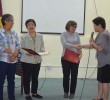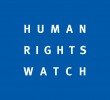Tim Johnson, correspondent for McClatchy Newspapers of the US, wrote
an article in May about the government’s “comfortable housing”
campaign in which he reported the relocation of some 250,000 Tibetans
“largely at their own expense and without their consent.” Johnson was
subsequently told by the Ministry of Foreign Affairs’ head of the
information department for North America, Europe and Oceania that his
reporting from Tibet included statements considered “unacceptable” by
the Chinese government, such as his assertion that foreign reporters are
generally allowed in Tibet just once a year, and that China’s policy is
repressive toward Tibetans.
On his blog, Johnson described the frustrations correspondents face in
trying to get the Chinese government to observe its own regulations on
foreign media freedom in Tibet and the risks that Tibetans face in
speaking with foreign reporters: “I had sought permission to go far in
advance through the Foreign Ministry and foreign affairs office of Lhasa,
but received no reply … (and) once I had arrived, security agents followed
me frequently, and people I had contact with were subject to lengthy
interrogation and even hefty fines.”
“If the government is trumpeting commitments to new reporting freedoms,
but then taking those freedoms away through incremental regulations and
arbitrary actions against individual journalists, then there hasn’t really
been any progress at all,” Richardson said.
Harassment of Chinese Researchers, Translators, and Assistants
Public Security Bureau and Ministry of Foreign Affairs officials also
routinely subject domestic Chinese assistants, researchers and translators
of foreign news bureaus to questioning and intimidation. “I was told
directly that I am responsible for what my boss writes and that I must
report to them when we plan to do �sensitive’ stories,” a Chinese assistant
to a foreign television network told Human Rights Watch. “All the
Chinese assistants face these risks and we have no protection.”
Even those Chinese citizens working for major international news outlets
are vulnerable. Zhao Yan, a researcher for the New York Times in Beijing
is serving a three-year prison sentence that runs to September 2007 after
being convicted of fraud in a case that was marred by multiple violations
of due process and concerns that his conviction was politically motivated.
Human Rights Watch has repeatedly called for his release.
Retaliation Against Foreign Journalists’ Sources
Intimidation and retaliation against foreign journalists’ sources and
interviewees is still prevalent. Fu Xiancai, an outspoken advocate for
villagers displaced for the Three Gorges Dam, was beaten by an unknown
assailant on June 8, 2006, after local police questioned him about his
interview with German television station ARD. Security officers in
Chongqing municipality (southwest China) threatened a local
environmentalist assisting a European journalist with a story on toxic
pollution, warning that the activist might face physical danger if he
returned to the area.
According to another foreign correspondent familiar with the incident, the
authorities recognized that the temporary regulations legally permitted the
ARD journalist to do what she was doing; “the local powers-that-be just
decided to go thuggish and go after the journalist’s source [instead].”
Chinese Journalists’ Concerns About Upcoming Regulations
Human Rights Watch is concerned that the Chinese government will
tighten its existing stranglehold on local journalists to ensure overall
control of information disseminated by state media in the run-up to the
Beijing Olympic Games.
Chinese journalists have expressed fears that rules due to be issued on July
1 from the General Administration for Press and Publications that will
tighten the registration requirements of domestic print media in China
indicate a looming crackdown on publications that at times challenge the
government line. Several Chinese journalists have privately told Human
Rights Watch that they anticipate the new regulations will strengthen the
government’s ability to shut down “offensive” publications affiliated with
larger state-owned media, but which lack licenses and registration.
Publications that have gained large readerships for taking courageous
stances in reporting cases of corruption and sensitive subjects are expected
to be particularly vulnerable to the new regulations ahead of preparations
for the 17th Congress of the Chinese Communist Party in October.
In the past two months, the Chinese government has hit at the popular
magazines Commoner and Lifeweek through measures including mass
transfers of its reporters and editors to other publications after the two
magazines covered “sensitive” topics including official corruption in the
countryside and events during the 1966-1976 Cultural Revolution period.
In January 2006, the Propaganda department sacked the editor of Freezing
Point, a weekly supplement to the China Youth Daily newspaper, and
temporarily suspended its publication before resuming it under a new
editorial team. A government document accused Freezing Point of
“viciously attacking the socialist system” for acts including the publication
of an article that criticized official middle school history textbooks.
Human Rights Watch urged the Chinese government to extend to Chinese
domestic journalists the same reporting freedoms granted to foreign
journalists under the temporary regulations and ensure that those rights are
upheld.
“Not only is China violating freedom of expression, but it is also engaging
in invidious discrimination against its own nationals,” said Richardson.
Both rights are guaranteed in the Universal Declaration of Human Rights
(UDHR) to which China is bound as a member of the United Nations, as
well as the International Covenant on Cultural and Political Rights, which
China has signed but not yet ratified.
“China’s long-planned 2008 Beijing Olympics �coming-out party’ can
easily become a public relations disaster if the government persists in
failing to honor its obligations to media freedom,” said Richardson.
For more of Human Rights Watch’s work on the 2008 Olympics in
Beijing, please visit: http://www.hrw.org/campaigns/china/beijing08/
For more of Human Rights Watch’s work on China, please visit:
http://www.hrw.org/doc?t=asia&c=china
IMPORTANT NOTICE: INBOX is an archive of press releases, statements, announcements, letters to the editors, and manifestos sent to Davao Today for publication. Please email your materials to davaotoday @ gmail.com. Davao Today is not responsible for the content of these materials. The opinion expessed in these items does not reflect those of Davao Today and its staff. Please refer to our terms of use/disclaimer.
World









